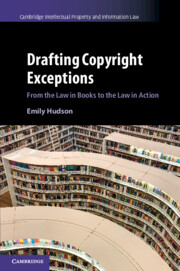Book contents
- Drafting Copyright Exceptions
- Cambridge Intellectual Property and Information Law
- Drafting Copyright Exceptions
- Copyright page
- Dedication
- Contents
- Preface
- Table of Cases
- Table of Statutes
- Part I Background
- 1 Introduction
- 2 Standards and Rules
- 3 Copyright and Cultural Institutions
- Part II The Law in Action
- Part III The Future
- Appendix Empirical Methodology
- Bibliography
- Index
- Cambridge Intellectual Property and Information Law
3 - Copyright and Cultural Institutions
from Part I - Background
Published online by Cambridge University Press: 31 March 2020
- Drafting Copyright Exceptions
- Cambridge Intellectual Property and Information Law
- Drafting Copyright Exceptions
- Copyright page
- Dedication
- Contents
- Preface
- Table of Cases
- Table of Statutes
- Part I Background
- 1 Introduction
- 2 Standards and Rules
- 3 Copyright and Cultural Institutions
- Part II The Law in Action
- Part III The Future
- Appendix Empirical Methodology
- Bibliography
- Index
- Cambridge Intellectual Property and Information Law
Summary
One of the key messages in this book is the importance of empirical work for any analysis of the operation and drafting of copyright exceptions. In order to illustrate these ideas, it uses as a case study the experiences of cultural institutions in Australia, Canada, the United Kingdom and the United States. This material is the culmination of fieldwork at institutions and industry peak bodies from 2004 to the present day, including site visits, review of publicly-available documentation and interviews with hundreds of people. In some cases, it reveals significant changes in the knowledge, resources and decision-making practices of institution staff, including new roles for free exceptions. It illustrates how norms can change over time but in other cases be quite sticky, raising the question of whether law should be reformed mainly in response to current behaviours and activities, or whether statutory change might provide signals that encourage new practices to emerge.
- Type
- Chapter
- Information
- Drafting Copyright ExceptionsFrom the Law in Books to the Law in Action, pp. 63 - 102Publisher: Cambridge University PressPrint publication year: 2020



